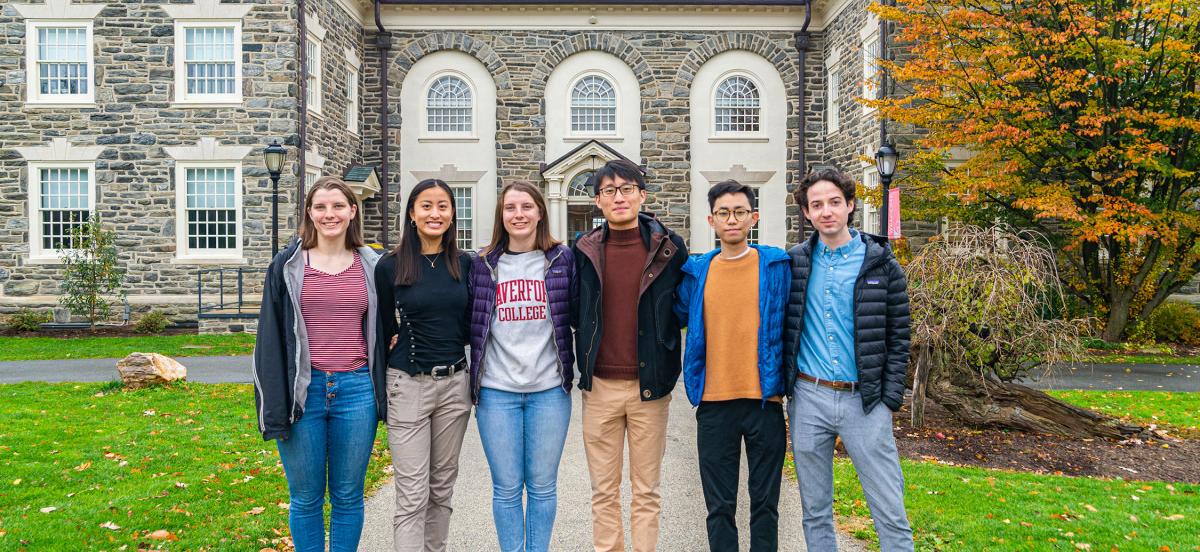Haverford Innovations Program Launches Microgrant Project

Team MATchMapper photographed in front of VCAM: (from left) Caroline Smith '23, Lyvia Yan '23, Maisie Smith '23, Shi Jie Samuel Tan '23, Tung Do '23, Isaac Wasserman '23. Photo by Patrick Montero.
Details
The campus home for entrepreneurship and innovation, which sponsors an annual summer incubator for student projects, has launched a year-round program to fund two student ventures each semester.
Since launching in 2017 with the opening of the new Visual Culture, Arts, and Media (VCAM) building, the Haverford Innovations Program (HIP) has encouraged the creation of many student companies, platforms, and other ventures. In addition to supporting two teams each summer as part of its Innovations Incubator—including last summer’s indie-fashion platform Haute and student-filmmaker platform SLOP—the program also funds hackathons, workshops, and other experiential learning opportunities in entrepreneurship.
This fall, HIP launched another way to support student innovation: HIP Mini Innovation Grants. These new small grants, currently $200 each, are given to two teams per semester as a way to offer financial assistance to sustain a project during the busy academic year when it isn’t a student’s only priority (as it is during the Summer Incubator).
Projects born from hackathons or class assignments often peter out, says Associate Program Director for HIP Shayna Nickel, due to lack of time and funds from their student founders. And while her office can’t do anything about the busy schedule of a Haverford student, she reasoned that she could find the resources to do something about their financial constraints.
“Within [HIP], we try to think about how best to use available low- or no-cost resources especially in early phases of development, but situations arise where development is stuck without some financial assistance,” she said. “Hopefully these small grants remove an impediment [to a project] that might end up as a showstopper. Another aspect of this funding is it may create an opportunity to help sustain groups leading up to the Incubator, where if accepted into the program, teams can immerse themselves in development with funding and mentorship support.”
This fall, Nickel selected the first two recipients of these new grants: Sam Tan ‘23 and Peter O’Mara ‘22, who are each leading teams of their own. Tan’s group—which features fellow Haverford juniors Tung Do, Isaac Wasserman, Lyvia Yan, Maisie Smith, and Caroline Smith—is working on MATchMapper, a project born of a 2020 CodeForPhilly hackathon that brings together public data in up-to-date listings for those seeking medication-assisted treatment for opioid addiction. O’Mara is working with a team from the University of Michigan on Simpl News, an online news platform for retail investors that features a personalized newsfeed and access to sell-side equity research.
Tan says that his team would not have been able to move forward with MATchMapper without this new funding from HIP.
“Everyone in our team is working on a voluntary basis and it would be difficult to develop a product that can be tested on large groups of people without a paid data hosting service,” he says. “Also, it would be harder to convince the public stakeholders to adopt our product if the user experience was compromised due to a subpar data hosting service. It means a lot to have been selected because it means that the College values the work that we are doing and that they believe that we are making a positive change to the society.”
Nickel hopes to eventually be able to expand the grant amounts or the number she is able to offer each semester. In the meantime, she will open applications for next semester’s funding in January. HIP is open to reviewing applications from all types of business ventures, but gives preference to work that looks to tackle social and environmental issues with an original perspective. Nickel says she also prefers teams that have already completed some work, such as a proof of concept or a functioning prototype.
“With HIP’s mission to encourage and support innovative and entrepreneurial energies, these grants bolster that outlook,” she said. “There’s a great deal of this curiosity and work within the community, but often it’s not seen, discussed, celebrated or recognized. My hope is that these grants not only elevate the visibility of this work, inspiring others to dive in, but also serve as a real means of support to help encourage that work by helping to move it to the next level.”



